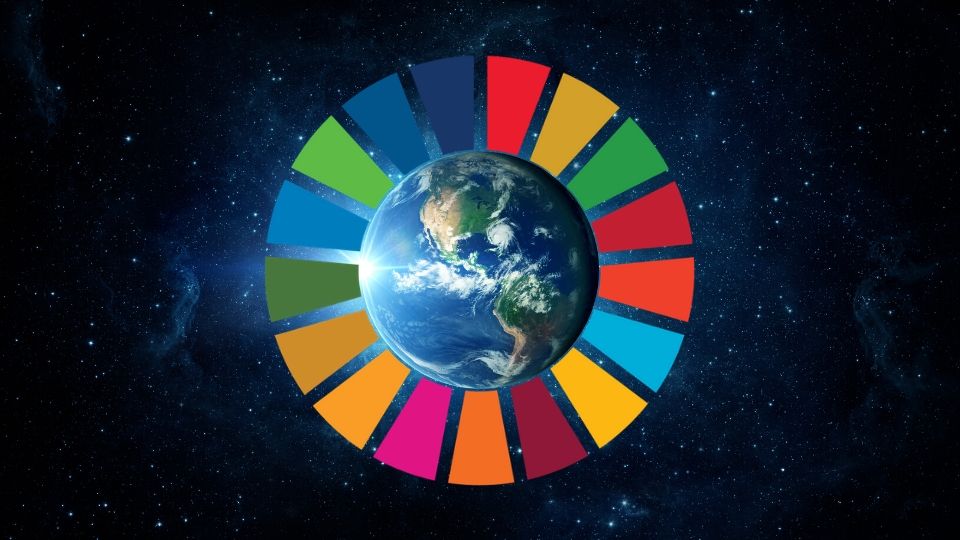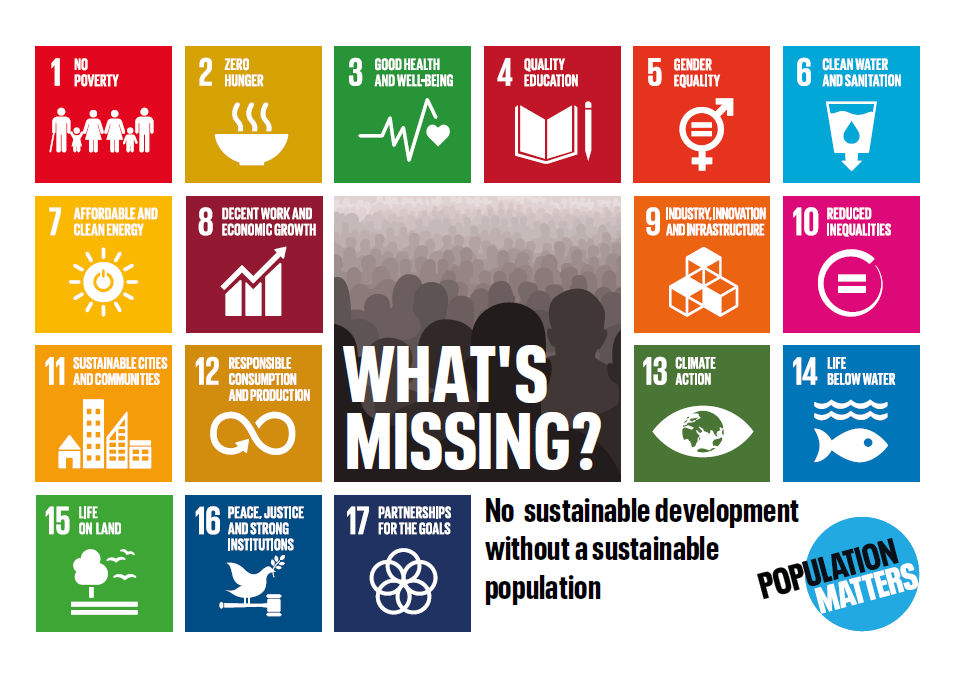
World Population Day 2020 – sustainable development needs a sustainable population
Saturday 11 July marked World Population Day and for us it was the culmination of a series of digital events that we hope will encourage and inspire people to talk about population issues. This year our theme and activities centred around the UN’s Sustainable Development Goals (SDGs).

With only ten years left to go, meeting the 17 SDGs looks perilously unlikely for many reasons, but failure to include population is one of them.
To date, only three out of 21 of the UN’s landmark environment and poverty reduction targets have been hit. The current forecast predicts the majority of goals will be missed by 2030 and, due to the pandemic, an additional 71 million people will have been pushed into extreme poverty in 2020. These are just headline stats – the UN’s latest progress report makes for a sobering read. The Novel Coronavirus will push back decades of modest gains and compromise the health and well-being of millions. Today, more than a quarter of the world’s population lack access to a secure food supply – and the number of people suffering from hunger and malnutrition has been increasing for the past five years. Some 4.2 billion people lack safely managed sanitation, with water scarcity set to displace some 700 million people by 2030.
This year, which happens to coincide with the UN’s Decade of Action to deliver the SDGs by 2030, we used World Population Day (WPD) to show not only how empowering and ethical solutions such as family planning, education and boosting gender equality are key to meeting the targets, but that it’s high time to talk more openly and explicitly about the impact of population growth on sustainable development.
Going global and digital
Unlike last year when we had the luxury to hit 3 cities – Lagos, London and New York – this year, due to the pandemic, we scaled up our digital presence to produce a range of free and accessible digital content:
- We launched a brand new video explaining how population solutions accelerate progress towards the SDGs
- We counted down the days to WPD on social media by explaining the links between population and each of the 17 SDGs
- We hosted a live panel discussion with experts
- We launched 24-page report on population and the SDGs for international stakeholders
The video
Our new animated video ‘Population and the Sustainable Development Goals’ provides an accessible overview of a complex subject and the relationship between problems and solutions in a short, attractive format. Watch it here:
The countdown
Every day in the run up to WPD we shared a graphic or video focussingon one of the 17 SDGs. We invited leading environment, health and development experts to comment on how population impacts on some of the goals. Watch the summary video below:
Our live panel discussion
To hear what leading experts and activists had to say on the subject we hosted Wendo Aszed, Founder and Executive Director of Kenya-based organisation Dandelion Africa, Kelley Dennings, Population and Sustainability Campaigner at the Center for Biological Diversity, Laurel Hanscom, CEO of the Global Footprint Network, and Mari Thekaekara, Indian writer and women’s rights activist for a digital Q&A which was livestreamed on Facebook. Almost 2,000 people from around the world watched the discussion and were able to submit their questions for the panel – we are very pleased to have reached a far greater audience than we would have been able to fit into a physical venue! Our Director Robin chaired the discussion which highlighted some key obstacles to sustainable development:
“As for [sustainability] goals we [India] have legislation, laws and family planning is free – but at end of the day women are not educated and even educated women cannot assert their rights. It comes down to women not being able to say they don’t want more kids. Unless they are educated and have money of their own it is hard for them to fight for their rights.” – Mari Thekaekara
Wendo Aszed, who leads our inspiring Empower To Plan partner project ‘Boys for Change’, pointed out that educating and engaging boys and men on gender and reproductive health issues needs to be part of the equation:
“Women can only get pregnant once a year…men can 365 days per year. Men need to be involved in reproductive health, need to come in much earlier, need to start much earlier!”
All these issues require what can sometimes appear to be uncomfortable conversations at the highest political levels. Laurel Hanscom from the Global Footprint Network made the point that part of this challenge comes from the false notion that humans are not a part of nature:
“All our activities are part of the same system. The biological essence of who we are in light of the pandemic and the interconnectedness of that is clear. Very challenging to undo the stigma of that conversation.”
Kelley Dennings, Campaigner at the Center for Biological Diversity (CBD) sees lasting progress occurring through the power of behaviour change. The CBD’s own survey amongst environmental groups highlighted that population issues are seen as complex, which is why many environmental stakeholders are reluctant to talk about them. The CBD is designing a toolkit to break down these complexities and empower environmental groups to talk more openly.
“[We are] building tools to decrease the complexity – heuristics, framing, etc. and providing it to others or other environmental groups to talk about this and get over some of the indiscretions of the past.”
Watch the full discussion:
Our new report for stakeholders
Our new report Hitting the Targets: The case for ethical and empowering population policies to accelerate progress towards the Sustainable Development Goals calls for urgent global action to empower people to choose smaller families. The report reveals how in several cases, progress towards meeting the goals has been or will soon be cancelled out entirely by population growth, leading to greater numbers of people suffering. Some of the key facts highlighted in the report:
- In June 2020, the World Bank forecast that population growth in the three countries which between them have a third of the world’s poor, Nigeria, India and the Democratic Republic of Congo, will outstrip economic growth, leading to more poverty
- The absolute number of people relying on polluting fuels and technologies for cooking has actually increased, reaching an estimated 3 billion people
- The number of people living in slums has grown from an estimated 792 million in 2000, to over 1 billion in 2016
- In sub-Saharan Africa, the number of girls out of secondary school has increased by 7 million due to the region’s population growth
- The number of women and girls subjected to female genital mutilation (FGM) is growing because of population growth, and could increase from 4.1 million in 2020 to 4.6 million a year by 2030
Our call to action
We urge policymakers to speak plainly about population and elevate the value of empowering and ethical population policies to achieve progress across all the SDGs. Post 2030, positive population solutions should be embedded in the framework which will replace the SDGs.
To accelerate progress we ask policymakers to:
- Defend and invest in the ethical population solutions already embedded within Goals 1, 3, 4 and 5
- Promote and publicise the value and importance of smaller family size, in wealthy and poor countries alike, in meeting the SDGs
- Ensure the value of ethical and empowering population action is recognised across all bodies and mechanisms intended to achieve the SDGs, including in multilateral environmental agreements.
It is hard to ignore the irony in the fact that the body that established WPD also created the SDGs, yet failed to include population as a factor in the achievement of the targets. To be successful, the international frameworks set up to create better, sustainable lives for all must address our population growth.
At Population Matters, we are proud to champion the key solutions that empower people to take charge of their lives and protect our only planet, and look forward to continuously expanding our influence on the global stage.
Take Action

Call on the UN to address the urgent need to end population growth and promote empowering solutions.
